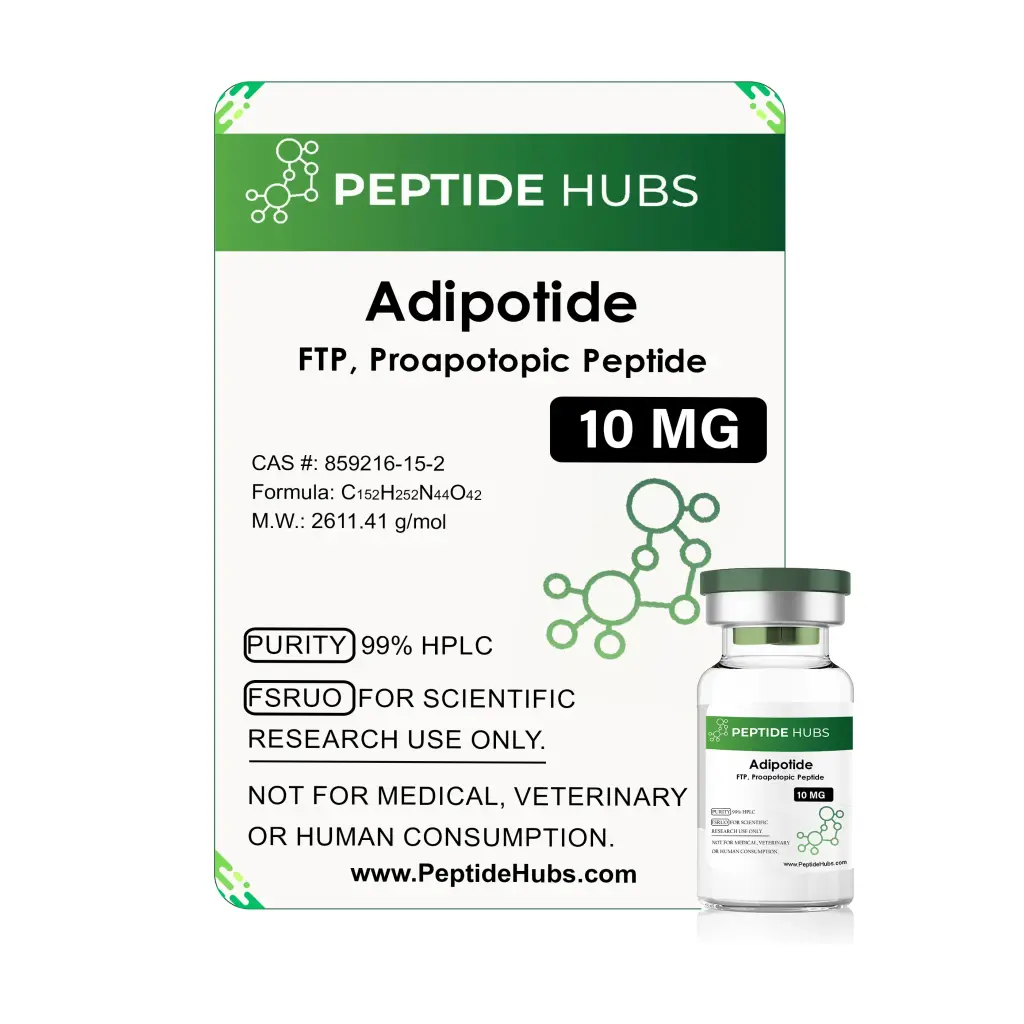

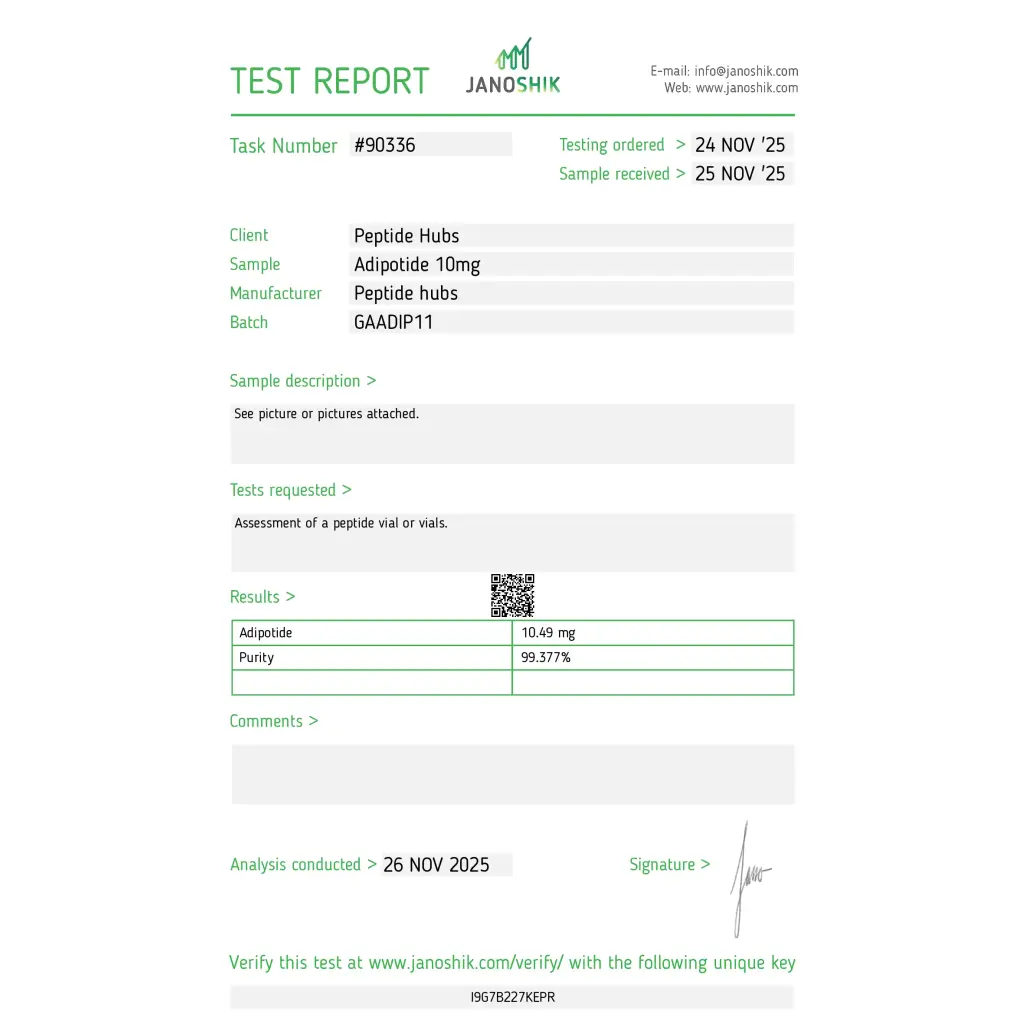



Manufacturer: PEPTIDE HUBS
Substance: Adipotide
Pack: Vial (10 mg)
Adipotide 10mg has become a point of interest in performance science due to its distinct place in metabolic research. Unlike peptides developed to influence muscle tissue directly, Adipotide is studied for its interaction with the vascular structures surrounding fat cells—making it a unique subject for athletes who follow body-composition research closely.
What sets this compound apart is the specificity of its design: Adipotide is composed of peptide sequences conjugated to a fat-targeting domain, a structure investigated for its potential role in modulating how adipose tissue receives blood supply. This direction of research gives it a very different profile from peptides focusing on recovery, inflammation, or hormone signaling.
For bodybuilders and competitive athletes, body composition is more than aesthetics—it influences leverage, gait efficiency, sprinting mechanics, thermoregulation, and endurance. Researchers exploring Adipotide have focused primarily on its vascular-based mechanism of action rather than metabolic interference. Because of this, it has generated curiosity in circles where maintaining a high ratio of functional muscle to body fat is strategically important.
Athletes often watch emerging research on adipose biology to understand how fat cells form, survive, and behave under training stress. Adipotide 10mg draws interest because it represents a different path of adipocyte-focused investigation: instead of targeting fat breakdown directly, researchers study how it interacts with capillary networks surrounding adipose tissue.
Scientific literature has investigated Adipotide for its unique approach:
It is designed to bind to specific proteins found in the blood vessels supporting fat tissue.
This investigational approach aims to reduce the efficiency of those vessels, potentially affecting nutrient flow to targeted cells.
This mechanism is fundamentally vascular rather than hormonal.
What makes Adipotide notable is that it does not mimic natural hormones or signaling peptides. It occupies its own category—one that examines fat tissue from an anatomical and circulatory angle.
For physique-driven athletes, the concept of modulating fat retention or distribution through vascular pathways is intriguing because it differs from traditional methods such as calorie manipulation, energy-system training, or endocrine-based strategies.
While Adipotide is not a performance enhancer and is not approved for athletic use, the area of study around it intersects with several domains athletes care about:
Powerlifters, fighters, rowers, and grapplers often work within strict weight limits. Research into new approaches to adipose biology—like those involving Adipotide—has strategic appeal.
Hard training stimulates significant metabolic adaptation. Compounds like Adipotide, which are studied for their fat-targeting selectivity, contribute to a broader scientific conversation about how fat cells interact with blood supply during caloric restriction and intense conditioning.
Too much nonfunctional mass can hinder acceleration, vertical power, and endurance. For this reason, athletes often keep an eye on emerging research in fat-cell biology.
It's important to emphasize that Adipotide 10mg remains a research compound, not a supplement or performance agent. But the scientific community's work on it helps athletes better understand:
how fat cells depend on vascular networks
how training and diet alter capillary density around adipose tissue
why certain body regions are more resistant to fat loss
how adipose cells adapt to long-term calorie manipulation
These areas of study inform smarter training and nutrition planning, even without direct use of the compound itself.
Peptides commonly discussed in bodybuilding—BPC-157, TB-500, GHK-Cu—tend to revolve around recovery, inflammation modulation, or tissue signaling. Adipotide is unique because:
It targets adipose tissue directly.
It is structurally different from most performance peptides.
It offers insight into vascular control rather than metabolic acceleration.
It brings attention to the structural biology of fat cells instead of endocrine pathways.
This gives it a level of uniqueness rarely seen in peptide-focused sports discussions.
Adipotide 10mg occupies a distinct place in performance-science discussions not because it enhances athletic output, but because it represents a novel approach in fat-tissue research. For bodybuilders and athletes who track emerging science to refine their knowledge of body composition, Adipotide provides a window into how vascular networks support adipose tissue and why fat distribution behaves differently across individuals.
Please log in to write Adipotide 10mg review.
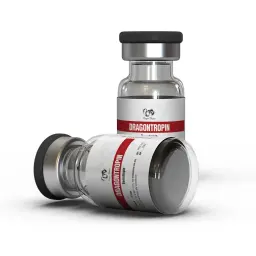

Drug Class: Anabolic Androgenic Steroid Injection
Administration: Intramuscular Injection
Manufacturer (Brand): KALPA PHARMA
Chemical Substance: Drostanolone Propionate
Strength: 100 mg/ml
Unit: 1 VIAL x 10 ml [Sterile Multiple Dose]
Common Dose: 300-500 mg/week; 8-10 weeks;
Goal: Cutting
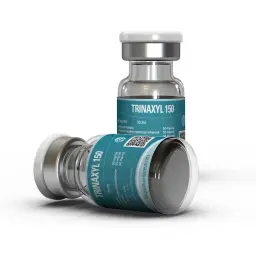
Drug Class: Anabolic Androgenic Steroid Injection
Administration: Intramuscular Injection
Manufacturer (Brand): KALPA PHARMA
Chemical Substance: Trenbolone Blend
Strength: 150 mg/ml
Unit: 1 VIAL x 10 ml [Sterile Multiple Dose]
Common Dose: 1ml/EOD; 4-8 weeks;
Goal: Cutting
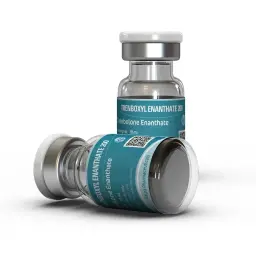
Drug Class: Anabolic Androgenic Steroid Injection
Administration: Intramuscular Injection
Manufacturer (Brand): KALPA PHARMA
Chemical Substance: Trenbolone Enanthate
Strength: 200 mg/ml
Unit: 1 VIAL x 10 ml [Sterile Multiple Dose]
Average Dose: 300 - 600mg/week; 8-12 weeks;
Goal: Bulking
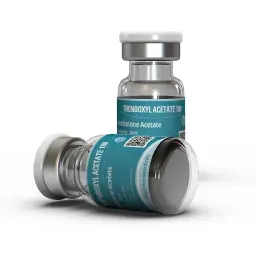
Drug Class: Anabolic Androgenic Steroid Injection
Administration: Intramuscular Injection
Manufacturer (Brand): KALPA PHARMA
Chemical Substance: Trenbolone Acetate
Strength: 100 mg/ml
Unit: 1 VIAL x 10 ml [Sterile Multiple Dose]
Dosage: 50-100mg/EOD; 6-10 weeks;
Goal: Cutting
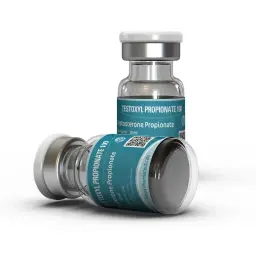
Drug Class: Anabolic Androgenic Steroid Injection
Administration: Intramuscular Injection
Manufacturer (Brand): KALPA PHARMA
Chemical Substance: Testosterone Propionate
Strength: 100 mg/ml
Unit: 1 VIAL x 10 ml [Sterile Multiple Dose]
Average Dose: 1ml/EOD; 6-10 weeks;
Goal: Lean Mass, Cutting, Strength
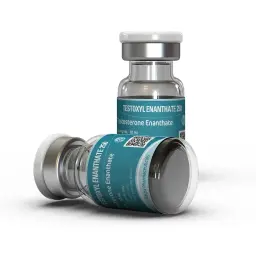
Drug Class: Anabolic Androgenic Steroid Injection
Administration: Intramuscular Injection
Manufacturer (Brand): KALPA PHARMA
Chemical Substance: Testosterone Enanthate
Strength: 250 mg/ml
Unit: 1 VIAL x 10 ml [Sterile Multiple Dose]
Common Dose: 2ml/week; 10-12 weeks;
Goal: Bulking
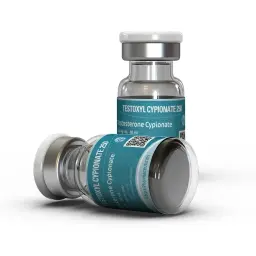
Drug Class: Anabolic Androgenic Steroid Injection
Administration: Intramuscular Injection
Manufacturer (Brand): KALPA PHARMA
Chemical Substance: Testosterone Cypionate
Strength: 250 mg/ml
Unit: 1 VIAL x 10 ml [Sterile Multiple Dose]
Effective Dosage: 500mg/week; 8-12 weeks;
Goal: Bulking